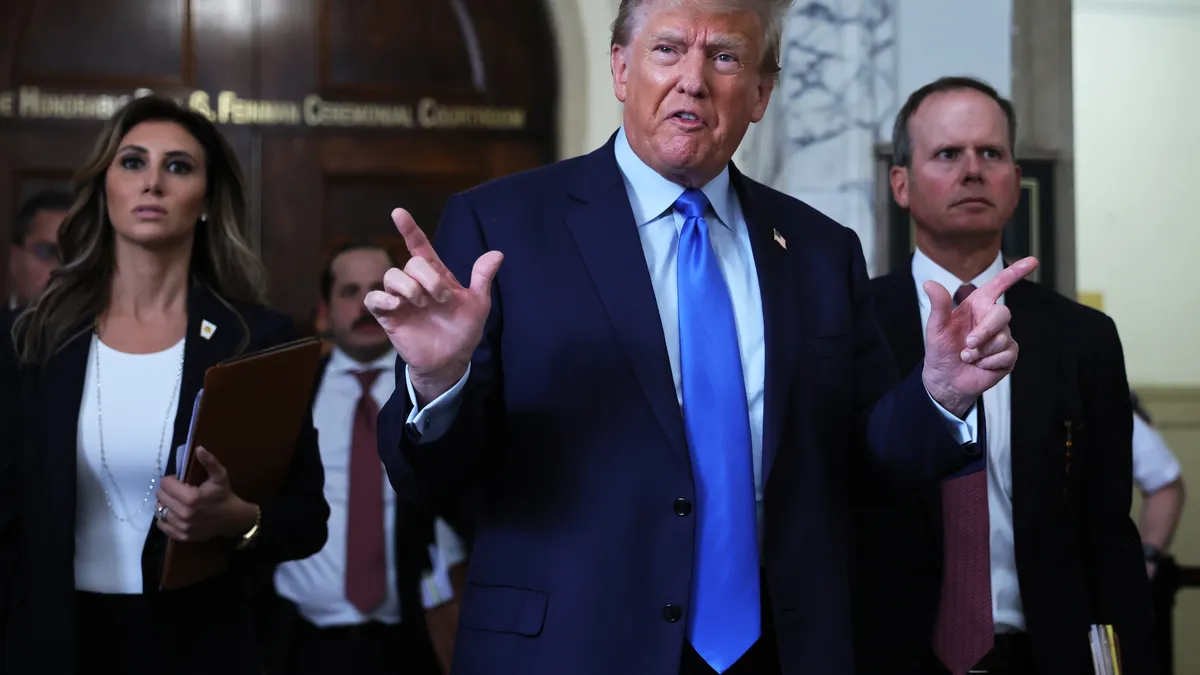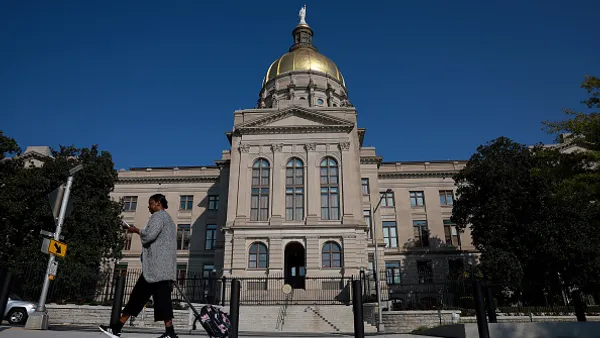Dive Brief:
- The New York Attorney General is seeking a “lifetime injunction” to permanently prevent former President Donald Trump, the ex-CFO of the Trump Organization, Allen Weisselberg, and ex-controller Jeff McConney from participating in the state’s real estate industry.
- “The individual defendants’ unlawful conduct is likely to recur absent an injunction,” the NY AG’s office wrote in a post-trial brief filed Friday. “The individual defendants have a demonstrated history of creating and using false financial documents in the real estate industry.”
- New York Attorney General Letitia James is also asking the organization to pay a $370 million fine relating to its suit, a jump from the $250 million it sought upon bringing the case which alleges key officials in the Trump family’s real estate company fraudulently inflated the former president’s net worth to obtain bank loans with more favorable terms than would have otherwise been available.
Dive Insight:
Attorneys for the Trump Organization argue that the NY AG “has woefully failed to prove her case and is not entitled to any of the relief sought in this action” in post-trial briefs also filed Friday.
Attorneys for the defense argue that no witness has testified the former president’s two eldest sons, Donald Trump Jr. and Eric Trump, “had anything more than a peripheral knowledge or involvement in the creation, preparation, or use” regarding the Organization’s statements of financial condition, which the NY AG alleges contains falsified valuations of numerous Trump properties.
The NY AG is also seeking a five-year ban for both Donald Trump Jr. and Eric Trump from participating in the state’s real estate industry or serving as an officer or director in any New York corporation.
The authority held by the former president, his two adult sons and Ivanka Trump and by key financial officials such as Weisselberg and McConney — both long-time employees of the Trump Organization — has been hotly debated as the civil fraud trial raged on.
Weisselberg’s authority in the organization fell under particular scrutiny, with the ex-CFO having logged a near 50-year tenure with the Trump Organization before departing in 2021 and receiving a $2 million severance agreement, CFO Dive previously reported. Separately the ex-CFO last year pled guilty to tax charges and was required to pay $1.99 million to New York State in taxes, penalties and industry.
The two eldest sons of the former president — both named defendants in the case — laid much of the responsibility for the company’s SOFCs on Weisselberg, with Eric Trump denying he had ever worked on a SOFC for the organization and insisting financial information would have been reviewed with Weisselberg rather than himself, CFO Dive previously reported.
His brother Donald Trump Jr., meanwhile, testified that he relied on Weisselberg to communicate key financial information to him during their time as co-trustees for the Trump Revocable Trust. Trump Jr. and Weisselberg briefly served in this capacity for the Trust, a business entity set up by Donald J. Trump to avoid potential conflicts of interest following his election as president, before Weisselberg’s departure from the organization.
“I had my buckets,” Trump Jr. previously testified, stating that Weisselberg managed internal finances and relationships with the organization’s independent accountants.
During the course of the trial, attorneys for the Trump family repeatedly sought to muddle the accounting waters, raising questions about both the particulars of accounting language and compliance requirements as well as the level of responsibility shared by Weisselberg, ex-controller McConney, and the Trump Organization’s former independent accountants, Mazars USA. Responsibilities for SOFCs were diffused between these multiple different parties, McConney testified, subject to review by the former president.
Both Weisselberg and McConney, as well as Donald Trump Jr., Eric Trump and the former president, are liable for falsification of business records, the NY AG’s office argues in its post-trial brief.
“Weisselberg had centralized control of financial reporting at TTO and had to approve any financial document before it was sent to an outside party….Thus, Weisselberg was in a position to modify any figure or methodology used in any SFC he approved,” the NY AG writes, noting that Weisselberg is also liable for “each act of falsification of business records pertaining to the SFCs committed by McConney.”












